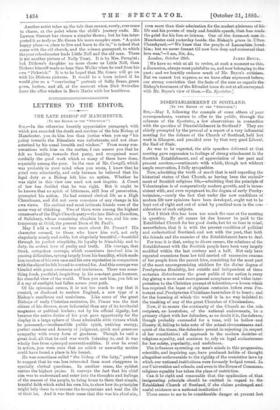LETTERS TO THE EDITOR;
THE LATE BISHOP OF MANCHESTER.
pro THE EDITOR OF THE " SPECTATOR." I Ste.,—ln the otherwise heartily appreciative paragraph with which you recorded the death-and.services of the late.Bish,op of Manchester, you do him. less than justice when you say " his policy towards the Ritualists wan unfortunate, and not char- acterised by his .usual breadth. and wisdom." From many con- Versationa with-him on the matter, I can assure you that he felt no hostility towards that party, and recognised. most cordially , the. good work which so many of them have done, especially among.the poor. In. the case of Mn. Cowgill, which was probably in your mind when you.. wrote, I know that he acted very reluctantly, and. only because, he believed that his legal. duty as a Bishop left_ him. no option. Whether he was. right in this view one need not now inquire. A Court of law has decided that he was right. But it ought to- be known that no spirit of bitterness, still less of persecution, prompted his action. Holed entered clerical life as a High Churchman, and- did not. seem conscious of any change in his own views: His earliest and_ most intimate friends were of the same way. of thinking. Two of them.were among, the highest ornamenteof the High Church-party—the late Bishop Hamilton, of Salisbury, whose examining chaplain he was, and, his con- temporary .at .Oriel, the present Dean. ofSt. Paul's.
May. I add a .word or two more about Dr. Fraser His character seemed, to those, who knew him well, not only singularly. manly and. noble, but singularly beautiful,—beantiful through. its perfect simplicity, its loyalty to. friendship and to duty, its ardent love of purity and truth. His courage, that. frank, outspoken courage, which sometimes involved him in. passing diffioulties„ sprang. largely from his humility, which made him careless of his own ease and his own reputation in comparison with the.obj ect be felt bound to contend for. And-this courage was blended with great sweetness and tenderness. There was some- thing fresh, youthful, inspiriting in his constant good humonr, his cheerful view of the world. When. you met him,, you felt as if a ray of sunlight had fallen across your path.
Of his episcopal career, it -is not too much to say . that it created, or disclosed to modern England,. a new type of a Bishop's excellence and usefulness. Like soma of the great Bishops of early Christian.centuries, Dr. Fraser was.. the first citizen of his diocese, more influential than any of it& territorial magnates or political leaders ; not . by his .official dignity, but because the active duties of his post gave opportunity for the display. in a large. sphere of those admirable civic virtues-which he possessed,—iucxhaustible public spirit, untiring energy,. perfect candour.and Amnesty of judgment, quick and, generous sympathy . with every form of goodness. Though. he said a great deal,. all that be said was worth listening., to„ and it was wholly free-from--episcopal conventionalities.. If ever he .erred in action, you—were sure that no selfish or .unworthy motive could have founcL a place in his.brea.st.
He was sometimes called "the- bishop- of the :laity," perhaps to suggest that he wa,s.less interested than most clergymen in specially clerical questions.. In. another . sense, the epithet carries the highest praise. It conveys the fact that. his. chief aim was to understand. and enter into the thoughts. and-fee]ings. of the masses of the people, to bring home to them that simple, trustful faith which-ruled his own life, to show-how its principles- might help them to overcome thetemptations and- heal the ills of their lot. And it was their sense that this was. his chief aim, even more than their. admiration for the-modest-plainness of hie. life and- his powers of ready and foreible.speeoh„that ,haa.made, the grief for his loss so intense. One -of , the foremost men.in_ Manchester said.yesterday beside-the BishopTs grave in..Uftens Churchyard,,.4i We knew that the people, of Lancashire loved-a him; but we-never dreamt till now how deep andmniversal that' love was.'-4 am, Sir, &c., [We have no wish at all to revive, at such a moment as this, a discussion, always most painfulto us, and now belonging. to the past ; and--we-heartily endorse much of -Mr. Bryce's criticism._ But we- cannot but express, as we have often expressed before,- our strong conviction that thelacts of the case as regards the, Bishop's treatment of the-Ritualist isues do not atoll correspond, with Mr. Bryce's view of them.—En. Spectator.]






































 Previous page
Previous page